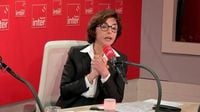Léa Salamé, a prominent host on France 2's Saturday night show Quelle époque !, faced off against Rachida Dati, the Minister of Culture, during a lively interview on France Inter on May 7, 2025. The exchange was anything but cordial as Dati defended her controversial reform of public broadcasting.
During the interview, Dati proposed the establishment of a joint holding company called France Médias, which aims to consolidate all public broadcasting entities—including France Télévisions and Radio France—under one umbrella. This initiative is part of her vision for a "French BBC," a move she believes is essential to preserve public service broadcasting in the face of competition from private French media and American platforms.
"Don't be afraid, Madame Salamé. France Inter will continue to exist as such," Dati insisted, attempting to assuage concerns over the future of the radio station amid her sweeping reforms. Despite her reassurances, Salamé remained skeptical, questioning the implications of such a restructuring.
The Minister's ambitions are clear: to create a robust public broadcasting landscape that can stand up to the challenges posed by private enterprises and foreign media giants. Dati emphasized the importance of this reform by stating, "We need to save the public service from the clutches of private groups and American platforms. This is about the future of our culture and information."
Salamé and her co-host, Nicolas Demorand, highlighted the rejuvenation of France Inter's audience, suggesting that the station has been successfully attracting younger listeners. "It’s becoming a club," they remarked, pointing to the station's growing popularity among a demographic that has traditionally been hard to reach.
However, Dati countered with her own observations about the audience demographics, saying, "It’s CSP+ and older," indicating that while there may be a younger influx, the overall audience still skews older. This exchange underscored the differing perspectives on the station's current standing and future potential.
In a pointed moment during the interview, Dati took aim at Sibyle Veil, the president of Radio France, who has openly criticized the proposed reforms. "Today, we are not yet at the level in terms of digital capabilities for public broadcasting," Dati remarked, emphasizing the need for modernization.
She further accused Veil of "caricaturing" her proposed reforms as a shift toward far-right policies, stating, "What interests me is not her future." This comment reflects the tension between Dati's administration and the leadership within public broadcasting, as they grapple with the implications of her reforms.
The debate surrounding Dati's proposals has sparked significant discussion among media analysts and the public. Some argue that the consolidation of public broadcasting under France Médias could streamline operations and enhance the quality of content offered to listeners and viewers. Others, however, worry that such a move could lead to a loss of diversity and independence within public media.
Critics of the reform have raised concerns that a centralized structure may stifle creativity and limit the variety of perspectives that are crucial in public broadcasting. The fear is that a "French BBC" model could result in a homogenized media landscape, where unique voices and local stories are overshadowed by a one-size-fits-all approach.
Dati's vision is not without its supporters, who argue that a stronger, more unified public broadcasting entity could better compete in an increasingly digital world. The rapid rise of streaming services and online media consumption has put traditional broadcasters under pressure, and advocates for the reform believe that adapting to these changes is essential for survival.
As the discussion around these reforms continues, the future of France Inter and the broader public broadcasting landscape remains uncertain. The outcome of Dati's proposals could have lasting implications for how news and culture are disseminated in France.
In the meantime, Salamé's interview with Dati has undoubtedly drawn attention to the critical issues facing public broadcasting today. The dialogue between the two women highlighted the challenges and opportunities that lie ahead as France navigates its media landscape in a rapidly changing world.
As the debate unfolds, it will be crucial for stakeholders in the media landscape—whether they are policymakers, broadcasters, or the public—to engage in constructive dialogue about the future of public service media in France. The stakes are high, and the decisions made in the coming months could shape the country's cultural and informational fabric for years to come.

